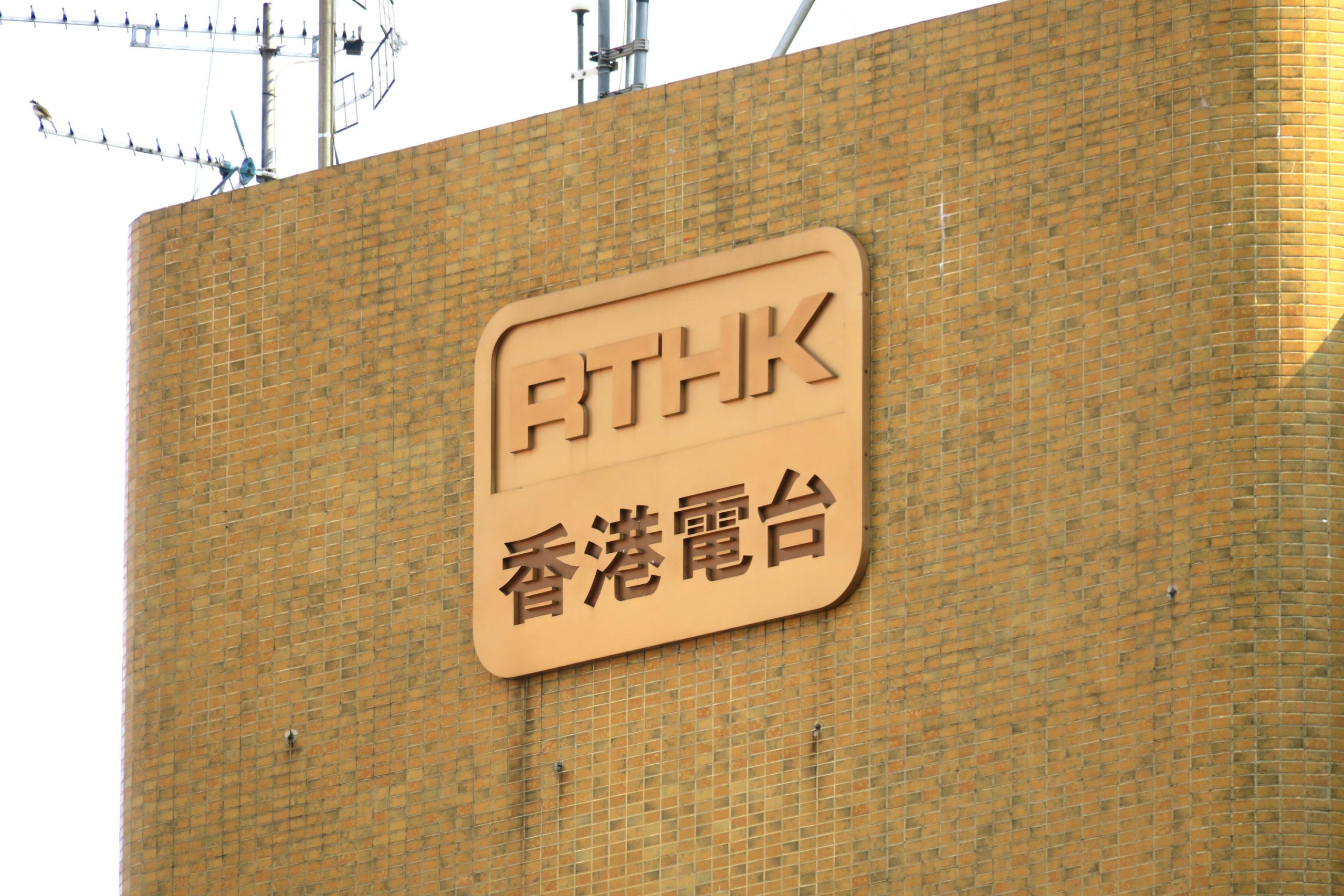A new partnership with China’s state media has made it abundantly clear that the editorial independence of Hong Kong’s public broadcaster is no more.
On 9 August, Chief Executive Carrie Lam announced that Radio Television Hong Kong (RTHK) would form a long-term partnership with China’s state media to broadcast more programmes that would “nurture a stronger sense of patriotism” in Hong Kong. The partnership will see RTHK’s TV 31 air TV shows and documentaries produced by China Media Group, the holding group for CCTV and CGTN. RTHK would also produce its own programmes to highlight developments in China and “advocate the importance of safeguarding the country’s national security”, Hong Kong Free Press (HKFP) reported.
The announced partnership has been met with criticism and concern. Reporters Without Borders (RSF) said that it was concerned the partnership would convert RTHK into a propaganda distributor and that while the partnership was claimed to be limited to TV dramas and documentaries, it was likely to extend to news programmes too.
RTHK maintains that the partnership is in line with its chartered mission of “engendering a sense of citizenship and national identity through programmes that contribute to the understanding of our community and nation”.
Meanwhile, the National Security Law continues to impact media independence and freedom of expression in Hong Kong. IFJ reports that the government has proposed a new retroactive law that would see the authorities refusing films’ certifications on national security grounds. The law builds upon guidelines published in June that restrict and remove the licensing of movies that are deemed to breach the National Security Law. Hong Kong residents could face up to three years in prison and a hefty fine for showing an unlicensed film.
Since the passage of the National Security Law in June 2020, the Public Media Alliance has reported numerous times on the deterioration of public and independent media in Hong Kong. Our reports on RTHK – a public broadcaster that had a long history of editorial independence – have shown how public media is bearing the double burden of the law and political interference.
While pressures at RTHK have been building over the past 15 months, our prediction in February that there was a grim future for the public broadcaster was, unfortunately, accurate. There has been a notable shift in the pace of change at RTHK since March, when Patrick Li, a career bureaucrat, took over as Director of Broadcasting.
Below, we review the timeline of events since March that have led up to RTHK effectively becoming a mouthpiece of the state.
March 2021
On 1 March, Patrick Li assumed the role of RTHK’s Director of Broadcasting after the previous director, Leung Ka-wing, stepped down six months ahead of the formal conclusion of his term. Li, a former civil servant with no broadcasting experience, took over amid programming criticisms from pro-Beijing supporters and shortly after the resignation of three senior RTHK officials. At the time, Li said he would “safeguard the editorial independence of RTHK as specified in the charter.” However, he added that there is “no freedom without restraint”. Before the end of the month, RTHK had abruptly cancelled two programmes, including one related to Beijing’s electoral overhaul.
Amid Li’s arrival, an RTHK producer – Bao Choy – was on trial for accessing car ownership details on official databases in relation to a 2019 report on police misconduct. She was subsequently found guilty and fined.
Read more: RTHK producer on trial amid wider concerns for public broadcaster (24 March)
April
In April, it was revealed that RTHK was in a “transition period” as it “reviews its operation in all aspects”. The revelation came as RTHK refused a journalism award for an episode of Hong Kong Connection about the 2019 Yuen Long mob attacks.
Meanwhile, the changes under Li – including programme cuts and the production of an episode of Hong Kong Connection by an external team – were applauded by Hong Kong’s Chief Executive, Carrie Lam. She said the broadcaster has rules to follow and must therefore ensure its programmes are in line with both the law and RTHK’s charter.
RTHK also announced that several posts would be created to help management implement recommendations from a government review that found so-called “deficiencies” in editorial management. RTHK hired four bureaucrats for both short- and long-term positions, as reported by RTHK and SCMP.
Read more: Hong Kong: Stifling of independent and public media continues (8 April)
Read more: Crisis facing independent journalism in Hong Kong escalates (26 April)
May
Soon after applauding the changes at the public broadcaster, CE Lam said that she would launch a talk show on RTHK. The show, “Get to Know the Election Committee Subsectors”, saw the politician interview other political figures and discuss reforms for Hong Kong. The programme was criticised for its lack of accountability, editorial independence and journalistic rigour.
The show came as RTHK continued to be dismantled: hard-hitting journalist Nabela Qoser was fired on World Press Freedom Day; there was an apparent purge of RTHK programmes from the internet; and threats of a new “fake news” law that would impact both RTHK and the wider landscape.
Read more: New talk show effectively transforms RTHK into a mouthpiece of the state (13 May)
June
By June, political interference had become rampant at RTHK. Programme cuts continued and the long-running current affairs programme, Letter to Hong Kong, was cancelled and replaced by another show. RTHK staff and shows came under increased scrutiny through new screening requirements for all programmes before they aired and an impending code of conduct. Yet another RTHK executive resigned – Jace Au, acting Assistant Director of TV and Corporate Businesses, had been with RTHK for more than 30 years – while firings occurred.
Further, disciplinary actions were announced for staff following the inclusion of “unapproved” footage in the show Legco Review. The show’s production was later taken over by an external team while Patrick Li said the staff could be forced to pay for the production costs themselves. Meanwhile, the Guardian reported that RTHK journalists were told to not produce political stories on the 4 June anniversary of the Tiananmen Square massacre.
Worse yet, more reshuffles were followed by the announcement of a series of new government-centred programmes on government policies and national development plans. The Broadcasting Director expressed his hopes for future collaborations with mainland media and RTHK reported that more programmes “promoting government policies [are] in the pipeline”.
Read more: Hong Kong: Crisis for RTHK’s independence (7 June)
Read more: Hong Kong: National security law takes its toll (22 June)
July
The deployment of the National Security Law against Apple Daily, resulting in the outlet’s closure, sent shockwaves throughout Hong Kong. Weeks later, the Hong Kong Journalists Association (HKJA) said in its annual report that press freedom in Hong Kong was “in tatters”. It was soon revealed that a “fake news” law was being seriously considered.
Again, cuts persisted at RTHK – this time, the current affairs radio show, China on the Dot, was removed from the airwaves. The show was criticised by pro-Beijing supporters for its critical coverage of mainland China. China on the Dot joined a growing list of shuttered shows, such as current affairs programme The Pulse and political commentary show Open Line Open View.
Meanwhile, RTHK staff were ordered to not use any language that referenced Taiwan as being separate from China or as a sovereign state. Staff were told to not refer to Taiwan’s leader Tsai Ing-wen as “president” nor Taiwan as a “country”, “Republic of China” or “ROC”, HKFP reports.
Read more: Hong Kong: Undermining of public media, independent journalism continues (29 July)
Header Image: RTHK’s Antenna together with Hong Kong’s night scene. Credit: Claude Tam/iStock
Related Posts
29th July 2021
Hong Kong: Undermining of public media, independent journalism continues
The fallout from the closure of…
13th May 2021
New talk show effectively transforms RTHK into a mouthpiece of the state
The Public Media Alliance condemns the…


